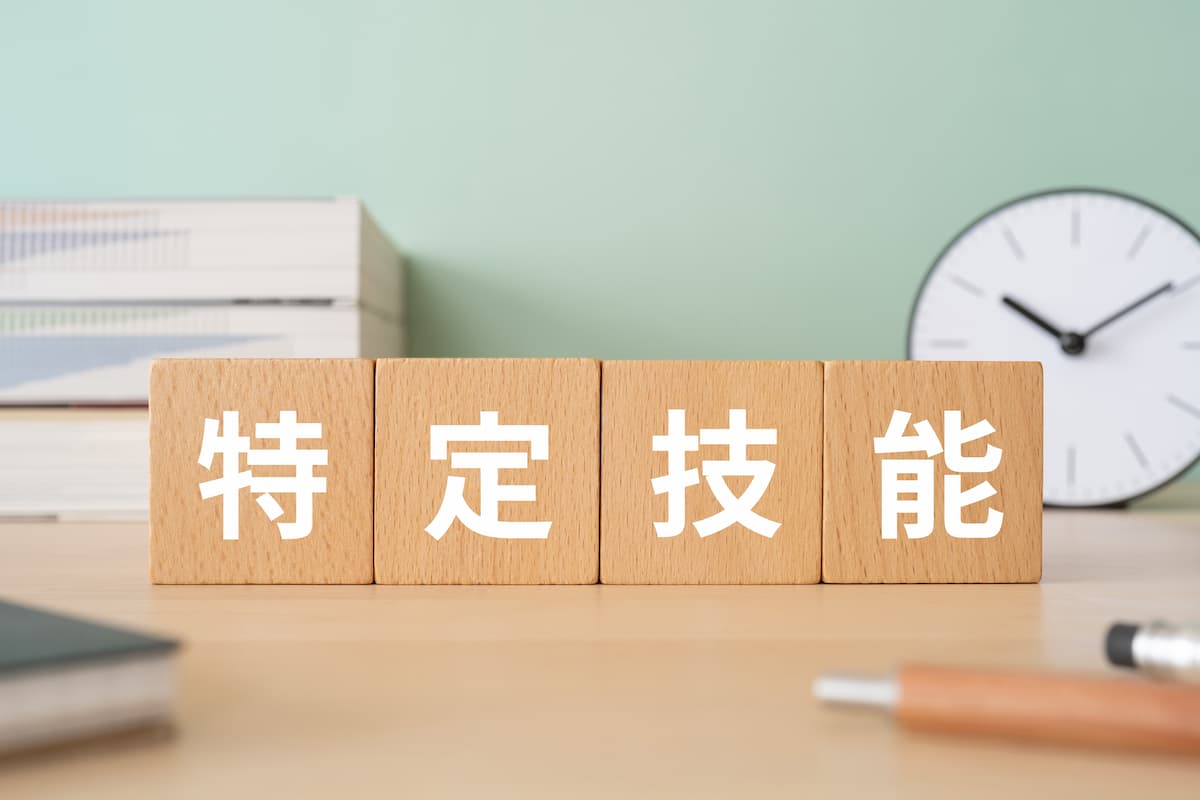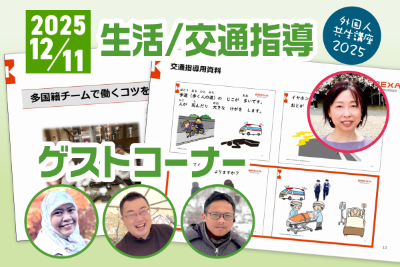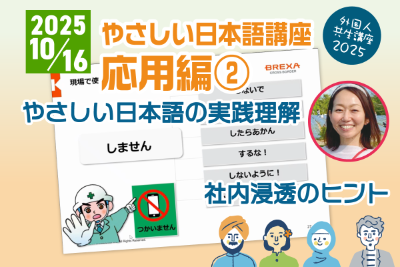- やさしい日本語
- ひらがなをつける
- Language
We provide multilingual content through machine translation. Translation accuracy is not 100%. About the multilingualization of the JAC website
- About JAC
- JAC Membership Information
- Specified Skilled Worker Acceptance
- Specified Skilled Worker Overview of the system
- 10 Mandatory Assistance for Foreigners
- Online individual consultation
- Seminar on Coexistence with Foreign Nationals
- Leading examples of host companies
- Case studies collection "Visionista"
- Foreigner's Voice
- Foreign Resident Acceptance Manual / Q&A
- Useful column "JAC Magazine"
- Acceptance support services
- Specified Skills Acceptance Support Service
- Skills improvement support
- Online Special Education
- Skill training
- Japanese Language Course
- Education and Training Support
- Subsidy system for obtaining qualifications
- Support for creating a comfortable workplace
- Temporary Return Support
- CCUS charge support
- Support system for promoting the accumulation of employment history
- Post-acceptance training
- Compensation system for Specified Skilled Worker (i)
- Daily life support
- Medical interpretation support
- Support for daily life problems
- freeJob matching
- The Specified Skills Evaluation Exam
- Home
- JAC Magazine
- Specified Skilled Worker System Key Points
- Specified Skilled Worker What questions should I ask in a job interview? Introducing examples of questions and precautions
- Home
- JAC Magazine
- Specified Skilled Worker System Key Points
- Specified Skilled Worker What questions should I ask in a job interview? Introducing examples of questions and precautions

Specified Skilled Worker What questions should I ask in a job interview? Introducing examples of questions and precautions
I wrote the article!

(One company) Japan Association for Construction Human Resources
Chief of Research and Development Department / Administration Department / Public Relations Department
Motoko Kano
(Kano Motoko)

Hello, this is Kano from JAC (Japan Association for Construction Human Resources).
What questions should I ask in an interview when accepting a Specified Skilled Worker?
Because foreigners have different cultures and values, you want to know what to ask and what to keep in mind.
In this article, we will talk about interviews when hiring Specified Skilled Worker.
Here are some things to check first, example questions, and precautions.
What is your style when interviewing for Specified Skilled Worker?
Specified Skilled Worker interviews are conducted in person, as well as online.
Many foreigners being interviewed live far away, and in recent years, there has been an increase in interviews in online formats.
Usually, the recruiter of the host company interviews with the foreigner who will be interviewed.
In addition, foreign employees may be present if the sending agency staff, interpreters, and foreign employees work at the host company.
If you are a Specified Skilled Worker who has obtained the status of residence "Specified Skills", you have a Japanese ability equivalent to N4 or higher in the Japanese ability test, but the Japanese ability test is a test that looks at reading and writing skills.
Many foreigners are not good at conversation.
During the interview, difficult information such as working conditions is included, so it is safe to ask the sending agency to interpret so that there are no mistakes or misunderstandings.
In addition to interviews, practical exams are also available.
If you want to see how much skill you have, ask them to show you their work as well as a workplace tour.
Interviews are usually conducted over 2~3 times, but in some cases, hiring is decided in one session.
What are the items to check and examples of questions in the Specified Skilled Worker interview?

If you accept Specified Skilled Worker, there are some things you must check.
If you don't check it thoroughly, it may develop into trouble later, so be sure to check the information you are going to introduce first.
Here are some examples of specific questions to ask during interviews.
What you need to check in a Specified Skilled Worker interview
During the Specified Skilled Worker interview, there are things to check, such as the contents of your residence card and proof of Japanese ability.
In addition to the following confirmations, please also bring your passport as an ID document.
Does the item on your residence card allow you to work?
When accepting a foreigner, you must confirm their residence status. If you accept a foreigner without a residence status, you may be subject to legal action.
The following items will be checked for your residence card.
- Residence card number: Has the number expired?
- Status of residence: Is it listed as Specified Skills (No. 1 or No. 2)?
- Expiration date: Is there an expiration date?
- Permission to engage in activities other than those permitted under the status of residence permitted: If permission has been granted, "Permission" will be displayed
If you are interviewing international students or Technical Intern Training students who plan to switch to Specified Skills, it is OK as long as your status of residence is "Student" or "Technical Intern Training".
You can check whether your residence card number has expired in the "Immigration Services Agency of Japan Residence Card Number Expiry Information Inquiry".
Have you passed Specified Skilled Worker (i) Skill Assessment Test in the field of employment?
In order to work at Specified Skills, there are exams that must be taken for each field.
For example, in the construction field, you must pass the construction field No. 1 skills evaluation exam.
Also make sure that the exam you are passing is in the field of work you want to hire.
It also seems that there is also a forgery of a residence card.
In addition to passing or failing a residence card or skills evaluation exam, you should also use the Japanese abilities necessary to obtain a Specified Skills to determine whether you have obtained a proper status of residence.
Japanese proficiency test result of N4 or higher or Japan Foundation Test for Basic Japanese pass certificate is required.
It is a good idea to tell them in advance that they will bring it to the interview.
If you want to check whether your transcript is legitimate, contact the organization that administers the test.
However, if you have completed the Technical Intern Training (ii) in good standing, you are exempt from the Japanese proficiency test.
Sample questions to ask during an interview with Specified Skilled Worker
During the interview, it is a good idea to start by asking basic questions such as the person's motivation for applying, why they came to Japan, why they chose this company/job, and their hopes for working.
In addition, including questions to get to know the person better and to find out about their enthusiasm and ambition for their work will make it easier to determine whether you will be able to work well together.
Now, let me introduce some example questions.
Examples of questions to find out your motivation for applying and your desired conditions
- Why did you choose to work in Japan?
- How long do you want to stay in Japan?
- Why do you want to work for this company?
- What kind of job do you want to do?
- How much do you want to work and how much do you want to be paid?
- When can you start working?
To avoid a mismatch with the host company, make sure you are both on the same page regarding your motivations for applying and the conditions for acceptance.
It is important not only to ask questions, but also to explain the company's policies and goals, as well as the work you want them to do, and to make sure they understand before answering.
Sample questions to get to know the interviewer
- What are your strengths and weaknesses?
- What is good about your country?
- What do you like about Japan?
- Have you had any problems living in Japan?
- What do your friends and family often say about you?
- When a problem occurs, how do you solve it?
- Is there anything you pay particular attention to in order to facilitate smooth communication?
- Please tell us if there is anything we should be careful about regarding the religion you believe in.
A person's personality also plays an important role in continuing to work.
You will be able to see their communication skills and proactiveness.
Of course, you can use the answers as a reference, but since many of the questions are relatively easy to answer, you can also check whether the person is speaking honestly and whether they are able to respond smoothly in Japanese.
Examples of questions to find out your enthusiasm and ambition for work
- How did you study Japanese?
- What skills or qualifications would be useful to work in this industry?
- Have you ever been scolded while working? What was the content of the scolding and how did you respond?
- What would you like to be able to do at this company?
- Do you have any dreams or future goals you want to achieve in Japan?
Asking questions about how they studied Japanese, their work experience, and their future plans is an opportunity to learn about their ambition.
Even if your technical skills are immature at the current stage, you can expect to grow if you have a strong desire to improve.
Also check points to note regarding interviews and acceptance
When accepting foreigners, there are times when care must be taken because their culture, ways of thinking, and customs are different from those in Japan.
We will also introduce some points to note when accepting an immigrant.
Ensure that you understand the terms of employment
This could lead to problems later on due to differences in employment conditions, so make sure that everyone understands through an interpreter or similar.
In terms of salary, let me explain that in Japan there are two types of salary: "take home pay" and "gross pay."
When talking about salary, it's important to be clear about which you are referring to and be on the same page.
Be sure to check the benefits and work location as well.
Check whether family consent is obtained
In some countries, family ties are strong and it is common for family members to interfere with where and under what conditions employees work.
As a result, even if the person being interviewed is motivated, it is not uncommon for their family to oppose the idea.
It is also necessary to check whether your family agrees with you working in Japan or for that company or industry.
Find out when you will start working
If you are an international student currently enrolled in a school or a Technical Intern Training student currently working in Japan, you will need to check when your Specified Skills permit will be granted and when you will be able to work.
In the case of international students, if you hire before the Specified Skills permission is granted, you may exceed the set working hours of "part-time work of up to 28 hours a week is acceptable".
Keep in mind that if you exceed it, you may be ordered to be deported or fined.
The acceptance of foreigners is also explained in detail in "Explanation of how to accept foreign workers in the construction industry and preparations!"
Please refer to it.
Summary: In Specified Skills interview, align your understanding through questions
In addition to face-to-face interviews, Specified Skilled Worker interviews have also been conducted online in recent years.
If possible, ask for an interpreter to ensure there are no mistakes or misunderstandings.
Also, make sure to check whether you meet the acceptance conditions, such as your status of residence and passport.
If proper acceptance is not carried out, you may be legally punished.
People tend to think that the questions asked in an interview are unique to foreigners, but in reality, they are not much different from what they are asked in an interview for Japan, such as asking about their motivation for applying and looking at their personality and ambition through questions.
However, differences in culture and customs can also lead to misunderstandings and mismatches.
In particular, it is important to carefully coordinate employment conditions.
JAC is here to answer a variety of questions about the acceptance of Specified Skilled Worker in the construction industry.
If you are a company that is considering accepting Specified Skilled Worker in the construction industry, please feel free to contact JAC!
*This article is based on information as of May 2023.
The author of this article

(One company) Japan Association for Construction Human Resources
Chief of Research and Development Department / Administration Department / Public Relations Department
Motoko Kano
(Kano Motoko)
Born in Aichi Prefecture.
He is in charge of public relations, research and investigation, and is the person behind social media.
We update our social media accounts daily with the desire to make people fall in love with Japan, to spread the appeal of construction from Japan to the world, and to ensure that Japan's construction industry continues to be the industry of choice around the world.
He is also engaged in research into the feasibility of implementing skills evaluation exam in Asian countries, and is conducting interviews with local organizations in each country.
Related articles

What is the estimated cost to pay for Registered Support Organizations? See how you can support yourself

What is Registered Support Organizations? Introducing the content of support in an easy-to-understand manner

What is the "life orientation" that is carried out when hiring a Specified Skilled Worker?

What is the number of people accepted for Specified Skilled Worker? Is there a limit to the number of people in the construction field?


















